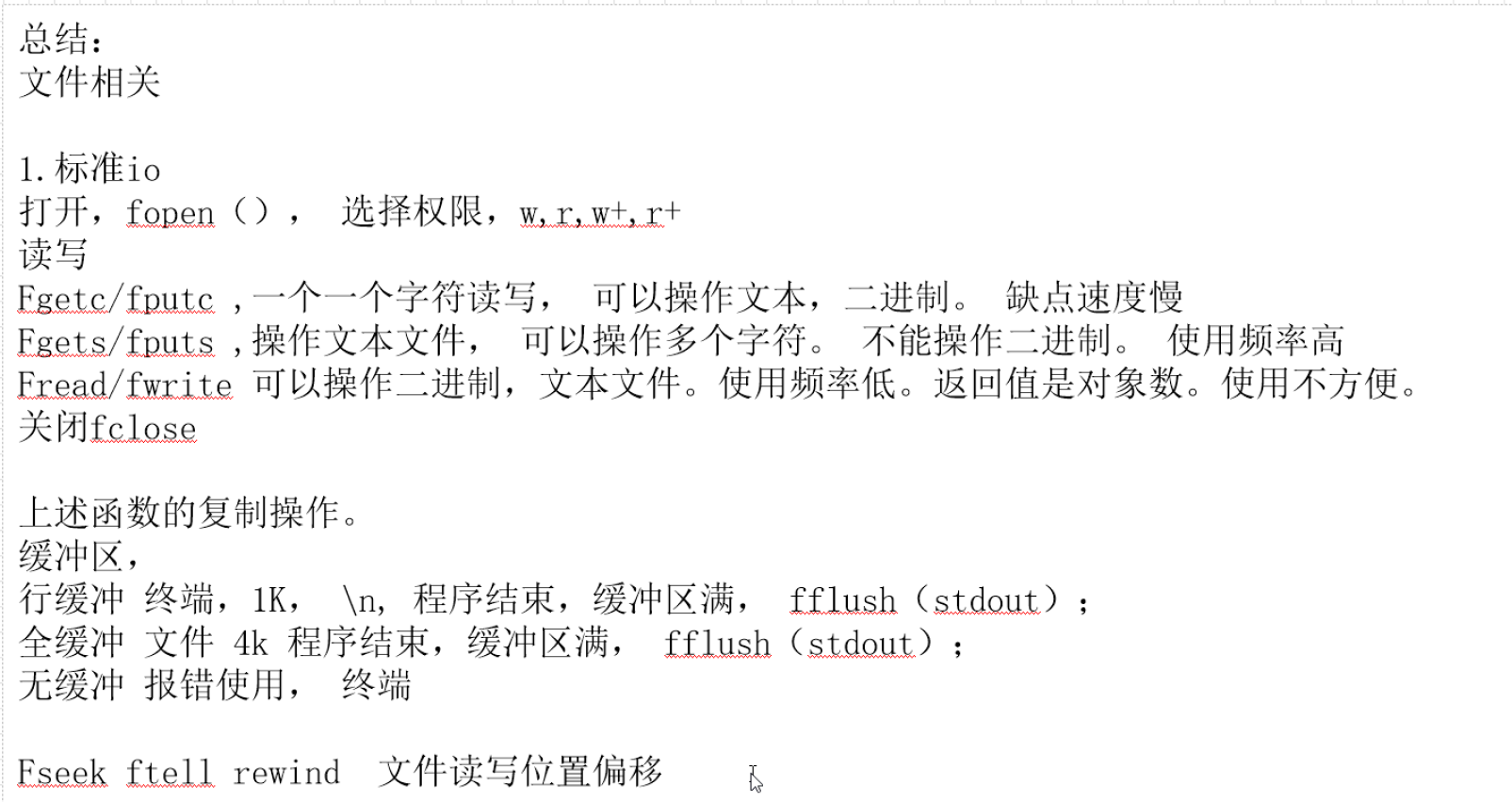一、文件IO相關函數
1.read/write cp
#include <fcntl.h>
#include <sys/stat.h>
#include <sys/types.h>
#include <stdio.h>
#include<unistd.h>
#include<string.h>int main(int argc, char **argv)
{if(argc<3){fprintf(stderr, "usage:./a.out srcfile dstfile\n");return 1;}int srcfd = open(argv[1],O_RDONLY);int dstfd = open(argv[2], O_WRONLY | O_CREAT | O_TRUNC, 0666);if (-1 == srcfd||dstfd==-1){fprintf(stderr, "open error\n");return 1;}while(1){char buf[1024]={0};ssize_t ret= read(srcfd, buf, sizeof(buf));if(0==ret){break;}write(dstfd, buf, ret);}close(srcfd);close(dstfd);return 0;
}2.文件的插入功能(insert_hw.c)
#include<stdio.h>
#include<string.h>
#include<stdlib.h>int main(int argc, char **argv)
{FILE*fp=fopen("1.txt","r+");if(NULL==fp){fprintf(stderr, "fopen error\n");return 1;}char data[]="aaa";int pos=4;fseek(fp,0,SEEK_END);long size=ftell(fp);fseek(fp, pos, SEEK_SET);char*end = malloc(size-pos);if(NULL==end){return 1;}fread(end, size-pos, 1, fp);fseek(fp, pos, SEEK_SET);fputs(data,fp);fputs(end, fp);free(end);fclose(fp);return 0;
}3.查字典
(1)klist.c
#include "./klist.h"void klist_init(KLIST* head)
{head->prev = head;head->next = head;
}void klist_add(KLIST* newnode,KLIST*prev,KLIST* next)
{newnode->next =next;newnode->prev = prev;prev->next = newnode;next->prev = newnode;}void klist_add_head(KLIST* head,KLIST* newnode)
{klist_add(newnode,head,head->next);
}
void klist_add_tail(KLIST* head,KLIST* newnode)
{klist_add(newnode,head->prev,head);
}void klist_del(KLIST*prev,KLIST*next)
{prev->next = next;next->prev = prev;
}
(2)klist.h
#ifndef __KLIST_H__
#define __KLIST_H__typedef struct __klist
{struct __klist *next;struct __klist* prev;
}KLIST;#define offset(type,mem) ((size_t) &((type*)0)->mem)
/*** @brief ptr 結構體node的指針type 結構體 per * mem node在結構中的變量名*/
#define containerof(ptr,type,mem) ({ const typeof(((type*)0)->mem) * _mptr = (ptr);\(type*) ((char*)_mptr- offset(type,mem)); })#define klist_for_entry(ptr,type,mem) containerof(ptr,type,mem)
/*** @brief p , 指向結構體的指針* n, 指向當前結構體的下一個指針mem, node在結構體中變量的名字*/
//for(p=klist_for_entry(&(head)->next,typeof(*p),mem),n=klist_for_entry((p)->mem.next,typeof(*p),mem);
#define klist_for_each(p,n,head,mem) \
for(p=klist_for_entry(head->next,typeof(*p),mem),n=klist_for_entry((p)->mem.next,typeof(*p),mem);\
&p->mem != (head); p=n,n=klist_for_entry((n)->mem.next,typeof(*n),mem))// #define offset(type,mem) ((size_t) &((type*)0)->mem)
// #define containerof(p,type,mem) ({\
// const typeof( ((type*)0)->mem ) * _mptr = (p);\
// (type*)((char*)_mptr - offset(type,mem));})
// #define klist_entry(p,type,mem) containerof(p,type,mem)// #define klist_for_each(p,n,head,node)\
// for(p=klist_entry((head)->next,typeof(*p),node),\
// n=klist_entry(p->node.next,typeof(*p),node); \
// &p->node != (head);p=n,n=klist_entry(n->node.next,typeof(*n),node))void klist_init(KLIST* head);
void klist_add_head(KLIST* head,KLIST* newnode);
void klist_add_tail(KLIST* head,KLIST* newnode);
void klist_del(KLIST*prev,KLIST*next);#endif ?(3)main.c
#include <stdio.h>
#include <stdlib.h>
#include <string.h>
#include "klist.h"
typedef struct
{char word[50];char mean[512];KLIST node;
} DATATYPE;int add_word(char* word, char* mean, KLIST* head)
{DATATYPE* data = malloc(sizeof(DATATYPE));if (NULL == data){perror("add_per malloc\n");return 1;}strcpy(data->word, word);strcpy(data->mean, mean);klist_add_tail(head, &data->node);return 0;
}DATATYPE* find_word(KLIST* head, char* word)
{DATATYPE *p, *n;// p 代表當前節點 n 是當前節點的下一個 head 鏈表的頭指針 node// ,自定義結構體中,節點變量的名字klist_for_each(p, n, head, node){// printf("%d %s\n",p->id,p->name);if (0 == strcmp(p->word, word)){return p;}}return NULL;
}int main(int argc, char** argv)
{FILE* fp = fopen("/home/linux/dict.txt", "r");if (NULL == fp){return 1;}KLIST head;klist_init(&head);while (1){char buf[1024] = {0};if (NULL == fgets(buf, sizeof(buf), fp)){break;}char* word = strtok(buf, " ");char* mean = strtok(NULL, "\r");add_word(word, mean, &head);}while (1){char want_word[50] = {0};printf("input word:");fgets(want_word, sizeof(want_word), stdin); // zoo\n #quitwant_word[strlen(want_word) - 1] = '\0';if(0==strcmp(want_word,"#quit")){break;}DATATYPE* tmp = find_word(&head, want_word);if (NULL == tmp){printf("can't find, %s\n", want_word);}else{printf("%s %s\n", tmp->word, tmp->mean);}}// system("pause");return 0;
}
4.lseek
off_t?lseek(int?fd,?off_t?offset,?int?whence);
功能:定位光標的位置
參數:fd:文件描述符;offset:偏移量;正:向后偏移;負:向前偏移;零:不偏移
whence:SEEK_SET;SEEK_CUR;SEEK_END
返回值:成功返回偏移量;失敗返回-1
#include <fcntl.h>
#include <sys/stat.h>
#include <sys/types.h>
#include <stdio.h>
#include<unistd.h>
#include<string.h>int main(int argc, char **argv)
{int fd = open("1.txt", O_WRONLY|O_CREAT|O_TRUNC,0666);if(-1==fd){fprintf(stderr, "open error");return 1;}off_t offset = lseek(fd, 1024, SEEK_SET);printf("%ld\n",offset);write(fd, "a", 2);close(fd);return 0;
}5.fopen與open 對應權限問題
fopen??open?
w??????? O_WRONLY|O_CREAT|O_TRUNC?
w+? ? ? O_RDWR|O_CREAT|O_TRUNC?
r? ? ? ? ?O_RDONLY?
r+? ? ? ?O_RDWR
a? ? ? ? O_WRONLY|O_CREAT|O_APPEND
a+? ? ? O_RDWR|O_CREAT|O_APPEND
6.fileno?????
轉換:?FILE*?fp?->?int?fd?????fgets(,);
int?fileno(FILE?*stream);
功能:獲得一個文件流指針中的文件描述符
參數:stream:文件流指針
返回值:成功返回文件描述符;失敗返回-1?
#include<stdio.h>
#include <unistd.h>int main(int argc, char **argv)
{FILE*fp = fopen("2.txt", "w");if(NULL==fp){return 1;}int fd = fileno(fp);write(fd, "hello", 5);fclose(fp);return 0;
}
7.fdopen
轉換:int?fd?->?FILE?*fp
FILE?*fdopen(int?fd,?const?char?*mode);
功能:將文件描述符轉化為文件流指針
參數:fd:已經打開的文件描述符
mode:"r"? "r+"? "w"? "w+"? "a"? "a+"
返回值:成功返回文件流指針;失敗返回NULL
#include<stdio.h>
#include <unistd.h>
#include<fcntl.h>int main(int argc, char **argv)
{int fd = open("2.txt", O_RDONLY);if(-1==fd){return 1;}FILE*fp = fdopen(fd, "r");if(NULL==fp){return 1;}char buf[512]={0};fgets(buf,sizeof(buf),fp);printf("%s",buf);fclose(fp);return 0;
}8.perror 系統錯誤警告
#include <stdio.h>
#include <errno.h>int main(int argc, char **argv)
{FILE*fp = fopen("5.txt", "r");if(NULL==fp){printf("error %d\n",errno);perror("fopen main.c:10");}return 0;
}
二、目錄操作

1.步驟
- 打開目標目錄?
- 讀取目錄
- 關閉目錄?
(1)opendir
????????DIR?*opendir(const?char?*name);
????????功能:打開一個目錄獲得一個目錄流指針
????????參數:name:目錄名
????????返回值:成功返回目錄流指針;失敗返回NULL
(2)readdir
????????struct?dirent?*readdir(DIR?*dirp);
????????功能:從目錄流中讀取文件信息并將保存信息的結構體地址返回
????????參數:dirp:目錄流指針
????????返回值:包含文件信息的結構體;出錯或者讀到目錄流末尾返回NULL
(3)關閉目錄?
?????????int?closedir(DIR?*dirp);
?????????功能:關閉之前已經打開的目錄流對象
?????????參數:opendir的返回結果中目錄流對象
?????????返回值:成功??0;? 失敗???-1;
2. 目錄的遍歷-ls
#include <stdio.h>
#include <sys/types.h>
#include <dirent.h>
#include <unistd.h>int main(int argc, char **argv)
{DIR*dir=opendir("../");if(NULL==dir){perror("opendir");return 1;}while (1){struct dirent*info= readdir(dir);if(NULL==info){break;}printf("%s\n",info->d_name);}closedir(dir); return 0;
}
3.time
tm?=?time(NULL);
功能:獲得1970年到現在的秒數
參數:t:存放秒數的空間首地址
返回值:成功返回1970年到現在的秒數;失敗返回-1
#include <stdio.h>
#include <time.h>int main(int argc, char **argv)
{time_t tm;tm =time(NULL);printf("%ld\n",tm);struct tm*tminfo = localtime(&tm);printf("%d-%d-%d %d:%d:%d\n",tminfo->tm_year+1900,tminfo->tm_mon+1,tminfo->tm_mday,tminfo->tm_hour,tminfo->tm_min,tminfo->tm_sec);return 0;
}
三、總結

四、補充
1.pwd -獲取當前路徑

2.ll -i? ?獲取編號

3.數字轉字符串
 ?
?
4.字符串轉數字 atoi

)






)






:角色菜單)



